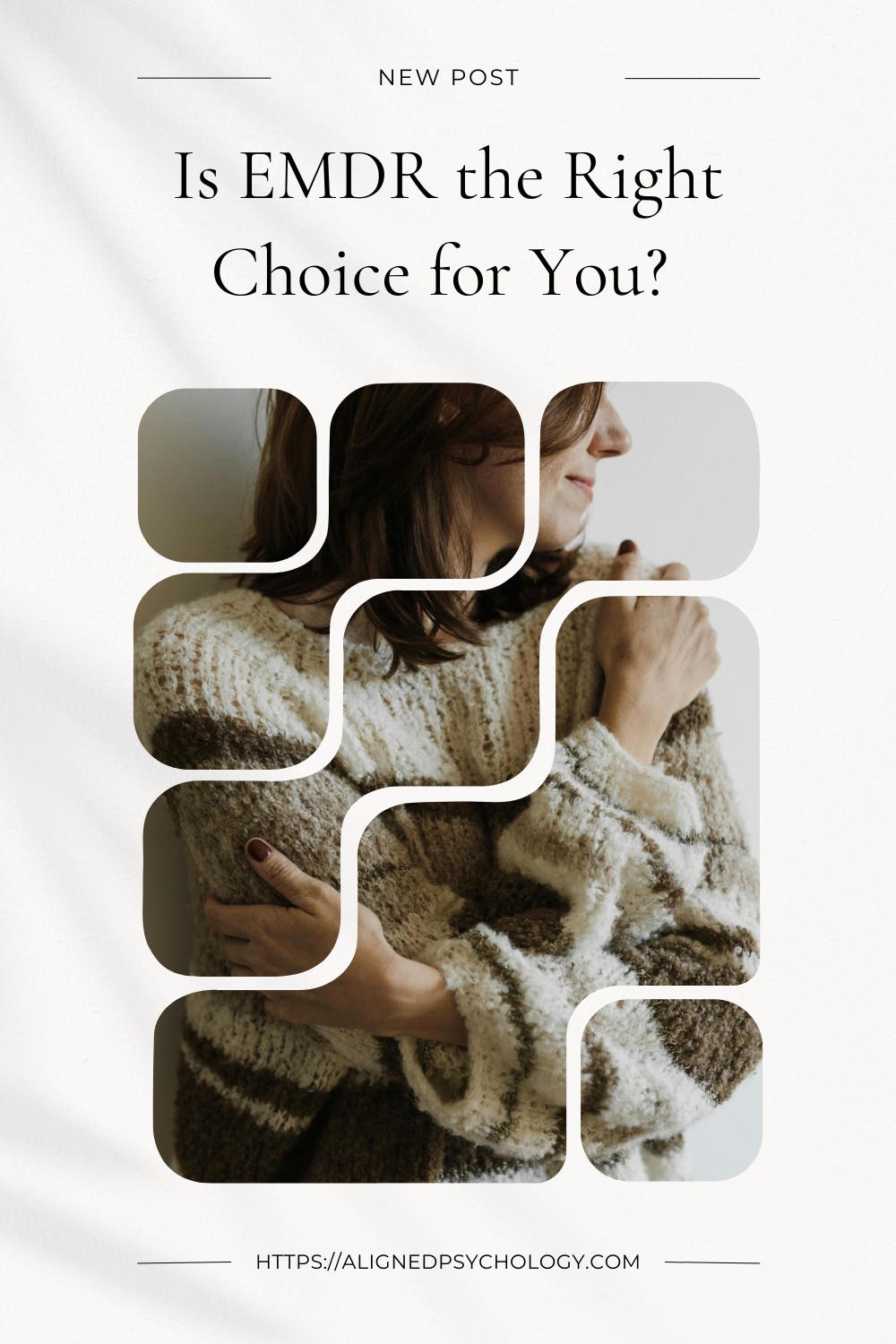Is EMDR Therapy the Right Choice for You?
Eye Movement Desensitization and Reprocessing (EMDR) is backed by strong evidence, but is it the right choice for you?
Making decisions about mental health treatment can feel overwhelming, especially when faced with various therapeutic options. Eye Movement Desensitization and Reprocessing (EMDR) therapy has gained significant recognition for its effectiveness in treating trauma and anxiety disorders. However, like any treatment approach, it isn't universally suitable for everyone. This article explores key considerations to help you determine if EMDR therapy aligns with your specific needs and circumstances.

Understanding What EMDR Addresses
Before deciding if EMDR is right for you, it's important to understand what this therapy was designed to treat and where research shows its strongest effectiveness.
EMDR Shows Strong Evidence For:
- Post-Traumatic Stress Disorder (PTSD): The most substantial research support exists for EMDR's effectiveness with PTSD, whether from single-incident trauma (accidents, assaults) or complex trauma.
- Specific Phobias: Research demonstrates EMDR can effectively reduce phobic responses to specific triggers.
- Anxiety Disorders: Many people experience significant relief from generalized anxiety, panic disorder, and social anxiety.
- Depression: Particularly when connected to traumatic experiences or negative life events.
EMDR Shows Promising Results For:
- Addiction: When substance use or behavioral addictions are connected to underlying trauma.
- Chronic Pain: Especially pain with psychological components or that developed after traumatic events.
- Performance Anxiety: Including test anxiety, public speaking fears, and sports performance blocks.
- Grief and Loss: Particularly complicated grief or traumatic loss experiences.
- Self-Esteem Issues: When negative self-beliefs stem from earlier life experiences.

If your challenges fall within these categories, EMDR might be worth considering as a treatment option.
Personal Factors to Consider
Beyond the presenting issues, several personal factors influence whether EMDR is appropriate for your situation.

EMDR Might Be a Good Fit If:
You struggle with "talking through" traumatic memories. Unlike traditional talk therapy, EMDR doesn't require detailed verbal recounting of traumatic experiences. This can be beneficial if you:
- Find it difficult to find words for your experiences
- Become overwhelmed when attempting to discuss trauma
- Have pre-verbal or early childhood trauma
You've tried traditional therapy with limited success. If you've engaged in conventional talk therapy but continue to experience intrusive thoughts, emotional reactivity, or physical symptoms related to past experiences, EMDR offers a different approach that targets how memories are stored in the brain.
You prefer a structured, time-limited approach. EMDR follows a clear protocol with identifiable phases and goals. While the number of sessions varies based on individual needs, it's generally considered a more time-limited approach than some other therapies.
You experience physical symptoms connected to emotional distress. EMDR's focus on both cognitive and somatic (body) experiences makes it particularly suited for addressing trauma that manifests physically through:
- Tension patterns
- Unexplained physical sensations
- Psychosomatic symptoms
- Body-based reactions to triggers
You're interested in addressing root causes rather than symptom management. Rather than focusing primarily on coping strategies, EMDR aims to resolve the underlying memories and beliefs that drive current symptoms.
EMDR Might Not Be Ideal If:
You're currently in crisis or have unstable life circumstances. EMDR processing can temporarily increase distress as memories are reprocessed. If you're experiencing:
- Active suicidal ideation
- Ongoing abuse or danger
- Recent major life changes
- Severe dissociation without management skills
It might be better to focus on stabilization and safety before beginning EMDR.
You have difficulty with internal awareness. EMDR requires the ability to:
- Notice internal sensations
- Identify emotions
- Track changes in your emotional state
- Follow your own associations
If these skills are challenging, preparatory work might be needed before full EMDR processing.
You're seeking primarily practical, skills-based interventions. While EMDR incorporates coping resources, its primary focus is memory reprocessing rather than skill development. If your main goal is learning specific strategies for current challenges, approaches like Cognitive Behavioral Therapy (CBT) or Dialectical Behavior Therapy (DBT) might better align with your needs.
You have limited time between sessions for self-care. EMDR processing continues between sessions as the brain integrates new connections. This can sometimes lead to:
- Increased dreams or memories surfacing
- Temporary emotional fluctuations
- New insights or awareness
If your current life circumstances don't allow space for these experiences, timing is an important consideration.

Medical and Psychological Considerations
Certain medical and psychological conditions require special attention when considering EMDR therapy.

Medical Conditions:
- Seizure disorders: The bilateral stimulation in EMDR could potentially trigger seizures in vulnerable individuals.
- Eye conditions: Traditional eye movement protocols may need adaptation for certain eye conditions or recent eye surgery. Bilateral tapping is a good alternative for those with these conditions.
- Pregnancy: While not contraindicated, processing intense trauma during pregnancy requires careful consideration.
- Recent cardiac events: The emotional activation during EMDR processing should be approached cautiously following cardiac incidents.
Psychological Conditions:
- Dissociative disorders: EMDR can be effective but requires a modified protocol and a therapist specifically trained in both dissociation and EMDR.
- Active psychosis: EMDR is generally not recommended during active psychotic episodes.
- Substance dependence: Active substance use that impacts cognitive functioning may interfere with processing.
- Severe personality disorders: These may require longer stabilization phases before processing trauma.
While these conditions don't necessarily rule out EMDR but may require:
- More extensive preparation
- Modified protocols
- Integration with other treatments
- Collaboration with medical providers
Practical Considerations
Beyond clinical factors, practical elements influence whether EMDR is viable for your situation.
Commitment and Availability
EMDR requires a certain level of commitment:
- Regular attendance (typically weekly, especially during active processing)
- Following through with multiple sessions (single sessions are rarely sufficient)
- Potential for temporary distress between sessions
- Practice of self-regulation skills
Financial and Insurance Factors
Consider the financial aspects:
- Whether your insurance covers EMDR therapy
- If not covered, whether you can manage the out-of-pocket costs
- The number of sessions likely needed for your specific situation
Therapist Availability and Qualifications
Not all mental health professionals are trained in EMDR. Consider:
- Availability of qualified EMDR therapists in your area
- Their level of EMDR training and experience
- Their familiarity with your specific concerns
- Whether telehealth options are available if local providers are limited
Making Your Decision: Next Steps
If you're considering EMDR therapy, these steps can help you make an informed decision:
- Consult with a mental health professional: Ideally one familiar with EMDR who can assess your specific situation.
- Ask specific questions about how EMDR might address your particular concerns:
- How might EMDR help with your specific symptoms?
- What would the treatment plan look like for your situation?
- What alternatives might also be appropriate?
- Consider a preparation or resourcing session: Many EMDR therapists offer initial sessions focused on stabilization techniques without full processing, giving you a chance to experience the therapeutic relationship.
- Research and education: Learn more about EMDR through reputable sources like the EMDR International Association (EMDRIA) or books written by qualified professionals.
- Trust your comfort level: The therapeutic relationship is crucial to successful treatment. If you don't feel comfortable with a particular therapist, it's appropriate to seek another provider.
Conclusion
EMDR therapy offers a powerful approach for processing traumatic memories and relieving associated symptoms. For many people, it provides relief when other therapies haven't fully resolved their concerns. However, like any treatment, it's not universally appropriate for everyone in every circumstance.
By considering the nature of your concerns, your personal preferences, your current life stability, and practical factors, you can make an informed decision about whether EMDR therapy is the right choice for you at this time. Remember that mental health treatment isn't one-size-fits-all, and finding the approach that resonates with your specific needs is key to successful healing.
If you're still uncertain, give us a call. We are EMDR-trained therapists and are happy to provide a free consultation. We can happy to discuss whether this approach would be a good fit for your unique situation, and will suggest alternatives if needed.

ABOUT THE AUTHOR
Dr. Chelsea
Chelsea Levenson PhD, Clinical Psychologist, specializes in creating safe, trusting space for clients on their journey toward healing. She specializes in somatic therapy and improving the mind-body connection. She is trained in trauma-focused modalities including Hakomi Somatic Therapy, EMDR, and IFS. She believes self-compassion, reflection, and awareness are keys to create lasting change. She worked in private practice, and intensive trauma treatment settings, including residential, PHP, and IOP levels of care.
Thank you for being part of a community of humans that deeply cares about healing.
We are honored that you stopped by and hope our resources will continue to bring value to your life.
We are accepting new clients in California, and referrals are always appreciated.












